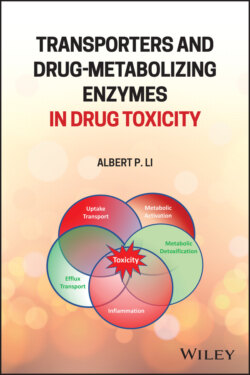Читать книгу Transporters and Drug-Metabolizing Enzymes in Drug Toxicity - Albert P. Li - Страница 43
2.5.9 Hepatic Transporters
ОглавлениеCertain genetic polymorphisms in drug transporter genes have been associated with increased DILI risk. In a study comparing 33 DILI patients and 95 European controls, Lang et al. sequenced ABCB11 and ABCB4, which encode BSEP and MDR3, and found four nonsynonymous mutations significantly associated with DILI, one of which resulted in a nonfunctional protein (ABCB11, exon 21: 2563G>A→G855R) [60]. Ciccacci et al. identified a variant in MDR1 (c.3435C>T) associated with nevirapine‐induced hepatoxicity in a study of 78 nevirapine‐induced hepatoxicity cases and 78 patients without hepatoxicity in Mozambique [108]. Another study found evidence that certain MDR1 polymorphisms can influence the basal CYP3A4 expression or function, i.e. individuals homozygous for MDR1 2677T (Ser893) had a higher hepatic expression or function of CYP3A4 than those homozygous for 2677G (Ala893) [109]. Daly et al. found that a variant in ABCC2, which encodes MRP2, was significantly associated with diclofenac‐induced hepatoxicity in a European population [55]. Interestingly, this same variant, ABCC2 C‐24T, was associated with a higher clearance rate and a shorter half‐life of deferasirox in the Chinese population [61]. A study of 94 drug‐ and herb‐induced hepatoxicity cases identified several polymorphisms in ABCC2 that were associated with susceptibility to liver injury in the Korean population [110].
